Here are just a few faces who have left their mark on our team.
Want to get involved?
Email Anne.R.Kapuscinski@dartmouth.edu or Devin.S.Fitzgerald@dartmouth.edu.
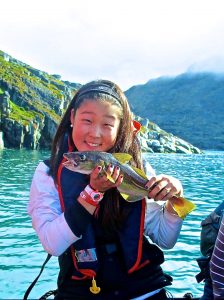 Ashley Bae, research assistant, is a final-year undergraduate at the University of St. Andrews, Scotland. Studying Biology, she took a year off of college to pursue research opportunities and came to Dartmouth in February 2016. Interested in marine conservation, food security, and fish stocks’ responses to climate changes and human influence, Ashley is honored to tackle sustainability issues in aquaculture with Anne. Ashley split her time while at Dartmouth between the Organic Farm and main campus.
Ashley Bae, research assistant, is a final-year undergraduate at the University of St. Andrews, Scotland. Studying Biology, she took a year off of college to pursue research opportunities and came to Dartmouth in February 2016. Interested in marine conservation, food security, and fish stocks’ responses to climate changes and human influence, Ashley is honored to tackle sustainability issues in aquaculture with Anne. Ashley split her time while at Dartmouth between the Organic Farm and main campus.
Nila tilapia’s (Oreochromis niloticus) ability to digest marine microalga:
On the farm (where the new wet lab & fish-rearing facility are located), she helped carry out a digestibility experiment in which a marine microalga (Nannochloropsis oculata) was used to replace fishmeal in otherwise traditional fish feed. Closer to what wild tilapia eat, as well as cheaper and more sustainable in terms of production and closing nutrient loops, N. oculata could prove an effective alternate protein source. Dr. Pallab Sarker is currently analyzing data from this experiment.
Anti-nutrient analysis of N. oculata:
In Dartmouth’s Environmental Measurements Lab, Ashley helped assess the anti-nutrient content of N. oculata by doing ash content & AIA analysis, and preparing samples for phosphorous analysis.
Microbial communities in the gut of O. niloticus:
Microbes are essential to digestion in all animals, and the role of bacteria as prebiotics or probiotics could be crucial in future aquaculture production. Preliminary work to identify microbial communities in tilapia, the 2nd most commercially grown fish globally, has been done. However, determining the microbial community assemblage in our new microalgal-based feeds has yet to be investigated. In the LSC, Ashley extracted DNA from guts of tilapia she dissected in the Organic Farm’s “Fish Barn.” Hoping to determine bacterial components using 16S sequencing, Ashley is excited to see how microbial communities might differ between traditional aquafeeds and those containing N. oculata as an alternative protein source in both whole-cell and co-product forms. 16S sequencing is currently in progress… Eventually, we would be interested in determining the microbes’ functions.
Last updated: October 2016
Interested in reading more on these topics? Here are two good reviews on gut microbiota in aquatic systems:
- Ganguly, S. and Prasad, A. 2012. Microflora in fish digestive tract plays significant role in digestion and metabolism. Reviews in Fish Biology and Fisheries. 22(1), pp. 11-16.
- Ringo, E., Zhou, Z., Vecino, J.L.G., Wadsworth, S., Romero, J., Krogdahl, A., Olsen, R.E., Dimitroglou, A., Foey, A., Davies, S., Owen, M., Lauzon, H.L., Martinsen, L.L., DeSchryver, P., Bossier, P., Sperstad, S., and Merrifield, D.L. 2016. Effect of dietary components on the gut microbiota of aquatic animals. A never-ending story? Aquaculture Nutrition. 22, pp. 219-282.
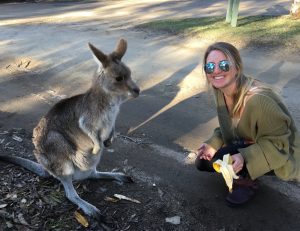 Alexandra Kariotis,
Alexandra Kariotis,
Ali is a Dartmouth ’17 from Tiburon, California. She is a Government major and Environmental Studies minor helping Professor Kapuscinski in her lab studying the substitution of traditional aquaculture feed with microalgae replacements. She helps in the lab with administering feed and recording data. She is interested in more sustainable business models. Her hobbies include skiing, biking and hiking.
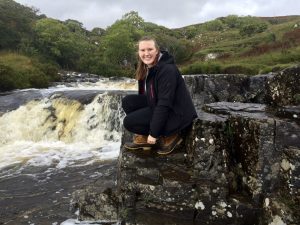 Bridget Douglas
Bridget Douglas
My current interests pertaining to ENVS are sustainability and renewable energy sources. In the lab, my specific interest is finding ways of closing the loop between micro algae and fish.
Summer 2016 my research focused on the water quality of the backwash water that was being dispersed in the permaculture garden located on the Organic Farm. At the lab, I performed the daily tasks, such as feeding, backwashing, water chemistry testing, etc., as well as my independent research.
I am working at the lab because I am interested in discovering how to make a growing industry like aquaculture more sustainable and environmentally friendly. My individual project at the lab, water quality, allowed me to assist in moving closer to the lab’s overall goal and my main interest of closing the loop in the micro algae aquaculture experiment. I am motivated to work on this experiment because I am concerned about the future in not only aquaculture, but many other industries that are largely unsustainable and environmentally harmful to our planet. I am very hopeful for the future though!
I am a thrower on the Dartmouth Track & Field team and a member of Chi Delta sorority. In my free time, I love to bike, bake, play in the snow, and go hiking with friends!
 Marcus Welker, PhD Student, Ecology and Evolutionary Biology
Marcus Welker, PhD Student, Ecology and Evolutionary Biology
Education: BS from University of Alaska Anchorage in Natural Sciences, 2009; MSc from King’s College London in Aquatic Resource Management, 2010
Awards: National Science Foundation East Asia and Pacific Summer Institute (NSF EAPSI), June 12 – August 22, 2012; Environmental Protection Agency Science to Achieve Results Fellowship (EPA STAR), beginning Fall 2012
In college, Marcus was first exposed to conflicts between natural resource extraction, fisheries, climate change, and indigenous and non-indigenous peoples. His thesis examined the climate change mitigation and adaptation strategies of Tatabanya, Hungary and Tromso, Norway and culminated in a collaborative process to draft Anchorage’s first Carbon Action Plan, identifying local and regional climate change mitigation and adaptation strategies and public policy actions. For his MSc thesis, Marcus initiated an Anchorage Adopt-A-Stream program that gives community members the opportunity to directly participate in improvement of salmon habitat quality.
These days at Dartmouth, Marcus is continuing to explore his interests in fisheries studying Atlantic salmon imprinting, homing, and restoration in New England and Quebec. He hopes to identify why hatchery supplementation to create river-runs and naturally reproducing populations has failed in the past and improve hatchery rearing and outplanting techniques. Marcus is conducting three studies: 1) exploring the spatial and temporal variability of amino acid compositions and concentrations in salmon streams (NSF EAPSI- Japan); 2) testing if Atlantic salmon imprint and home to amino acids present in stream waters (EPA STAR); and 3) investigating the molecular mechanisms for amino acid olfaction in Atlantic salmon. Restoring river-runs of Atlantic salmon would provide numerous ecosystem services to the Lake Champlain basin, while also strengthening the environment and economy. When Marcus isn’t splashing around in rivers collecting water samples, tracking down fish, and getting his tan on, he is exploring the vast wilderness of New England, riding his bike (or fixing it, because he tends to break it), or playing in the snow.
Research Assistants
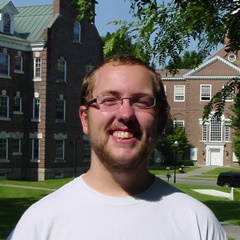 Alexander Sitek, Research Assistant (2014-present) Education: BS from Mansfield University of Pennsylvania in Biology with concentrations in Fisheries Biology, Environmental Biology, and a minor in Chemistry
Alexander Sitek, Research Assistant (2014-present) Education: BS from Mansfield University of Pennsylvania in Biology with concentrations in Fisheries Biology, Environmental Biology, and a minor in Chemistry
Alex works with the Kapuscinski lab to further explore sustainable fish feed and integrated food energy systems (IFES). He maintains the broodstock tilapia at the Dartmouth Organic Farm and assists Professor Kapuscinski and her team with their ongoing research. Alex says that most rewarding experience working with this lab is, “the scientific approach to solve real world problems in an effectively sustainable manner”. Outside of the lab, Alex enjoys keeping aquariums, scuba diving, fishing, hunting, camping, and reading books.
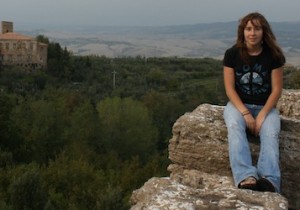 Mariah Coley ’11, Research Assistant (2013-2014)
Mariah Coley ’11, Research Assistant (2013-2014)
Education: BA from Dartmouth College in Classics, Studio Art with digital photography concentration
Mariah supports the Kapuscinski lab group’s research in sustainable fish feeds for tilapia aquaculture, maintains the tilapia stocks at the Dartmouth Organic Farm and assists Professor Kapuscinski with Chair activities and the administration of the Sustainability Minor. The most exciting aspect of the work is the emphasis on integrated approaches to problem-solving: “Real-world sustainability questions are naturally a tangle of science, economics, communications, social issues and politics, and I think that addressing each of these as a part of the system is the best way to make progress.” Mariah hopes to pursue a career in sustainability using this integrated approach. Outside, Mariah is often rock climbing, running or throwing a frisbee for her dog, but in bad weather she also loves experimental cooking, drawing cartoons and listening to NPR.
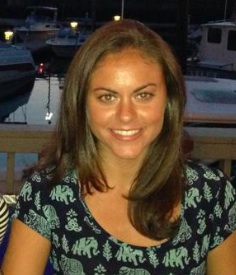 Alison Lanois ’15, James O Freedman Presidential Scholar
Alison Lanois ’15, James O Freedman Presidential Scholar
Major: Environmental Studies, Geography
Alison has been assisting with the ongoing fish diet experiment which involves replacing fish oil with a more sustainable algae alternative. Among other things, she been involved with caring for the fish, experimental set up, and making fish food. She is a member of the Dartmouth cross country team and a distance runner on the track team, as well as a FCA student leader and a member of Kappa Delta Epsilon sorority. She enjoys hiking and skiing in her free time. Fun Fact: She has a long-haired gray cat named Squirrel.
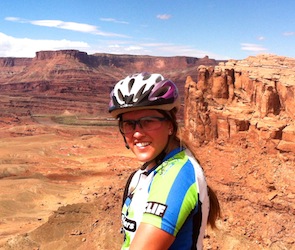 Katie Bernhard ’15, Research Assistant
Katie Bernhard ’15, Research Assistant
Major: Environmental Studies, Ethics Minor
Katie spent the summer 2013 working with tilapia to determine the effect of replacing fish meal and fish oil in commercial feed with microalgae. This could have important implications for sustainability in aquaculture, which uses energy-intensive and unsustainable fishing methods to obtain fish meal and fish oil for feed. This fall, she will also begin research on how the pH of tilapia stomachs breaks down microalgae. Katie believes that sustainable aquaculture and IFES will be increasingly important for energy and food security around the world as the technology advances. She loves applying knowledge from her research to her Environmental Studies classes. Eventually, Katie wants to pursue a career in environmental law or energy and agriculture policy. Outside the lab or when she is home in Park City, Utah, Katie loves skiing, mountain bike racing, and ceramics! She is also studying arabic at Dartmouth and is looking foward to traveling to Fez, Morocco to learn more.
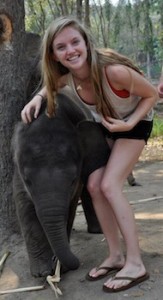 Erin Livesey ’15, James O Freedman Presidential Scholar
Erin Livesey ’15, James O Freedman Presidential Scholar
Major: Environmental Studies, Pre-Vet
Erin supports Dartmouth Team IFES’ laboratory feeding experiments. She helps look after the daily needs of the tilapia, conducts literature research on tilapia feeding behavior, and is developing an experiments to determine the pH of tilapia stomachs. Dartmouth Team IFES is exploring the integration of food and energy production by utilizing valuable waste materials. Erin loves animal care in general and is passionate about finding ways to eat sustainably. With aquaculture as the fastest-growing animal production industry, Erin thinks it is imperative that we find a way to farm fish sustainably. Down the road, she would “love, love, love” to be a wildlife veterinarian working in conservation, whether it be in Africa, Thailand, or a zoo. Outside the lab, she loves to explore fun places around the Upper Valley with friends, make funky foods, and find cute pictures of animals. Fun Fact: She’s hand-fed a polar bear a jelly bean-yikes!
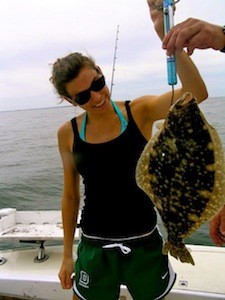 Madi Gamble ’13, Senior Honors Thesis
Madi Gamble ’13, Senior Honors Thesis
Madi completed her senior honors thesis on the digestibility of phosphorus in microalgae-based tilapia feeds with the Kapuscinski lab in 2013. Her work was a component of Pallab Sarker’s larger digestibility study investigating the feasibility of replacing fishmeal and fish oil in tilapia feed with microalgae. Using fishmeal and fish oil in aquaculture feed is both economically and environmentally unsustainable, as these ingredients are very expensive and come from overharvested stocks of forage fish that form the base of fragile marine food webs in the wild. Altering feed formulation is vital to improving the sustainability of aquaculture, and replacing fishmeal and fish oil with microalgae, which has the potential to be grown cheaply and sustainably, may be one step in the right direction.
When she’s not feeding fish, Madi loves running, sailing, skiing, and generally being outside. Currently she’s working in the Water, Natural Resources, and Ecotoxicology division at EA Engineering, an environmental consulting firm, and she hopes to continue studying fish biology and ecology someday in graduate school!
Bonita Langle ’13, Senior Honors Thesis

